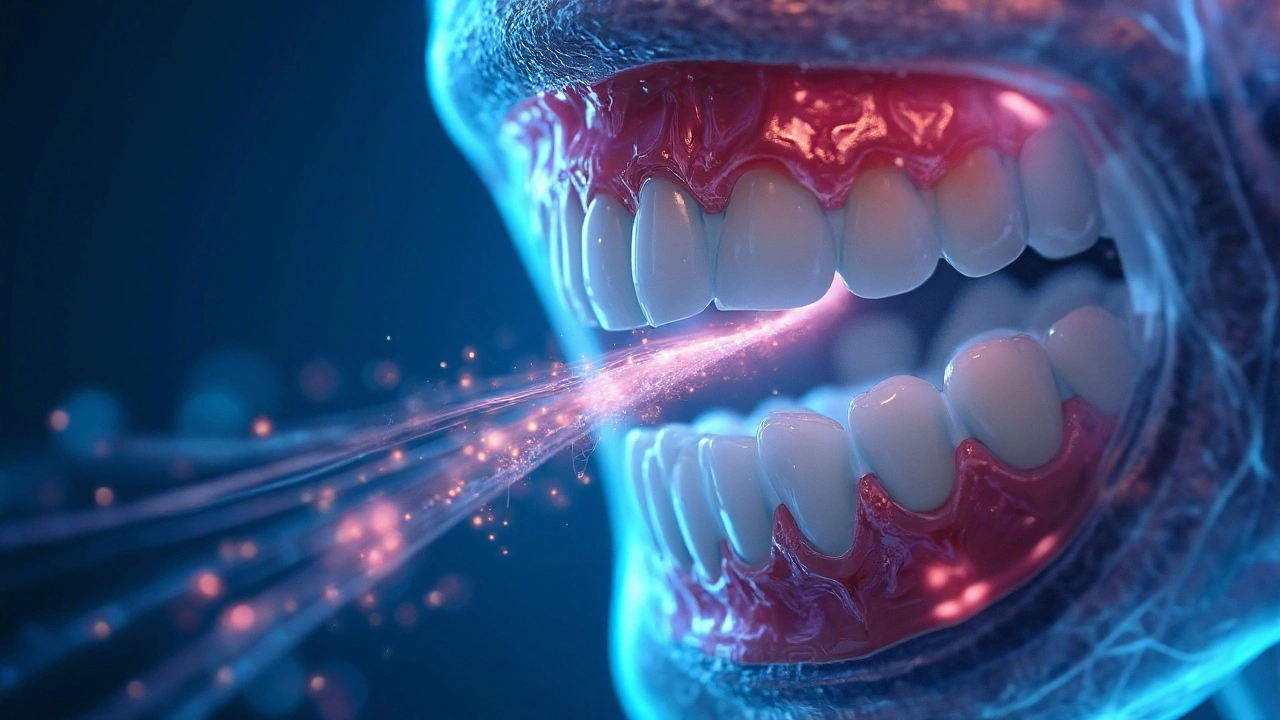Ever heard of calcitonin and wondered what it has to do with your teeth or gums? Dental disease isn’t just about cavities—bone loss and gum problems bring serious pain and long-term trouble. If you’re searching for new ways to protect your oral health or wondering if calcitonin could make a difference, here’s exactly what you need to know. You’ll get clear science, zero hype, and tips you can actually use.
TL;DR / Key Takeaways
- Calcitonin helps slow down bone breakdown, which plays a role in fighting dental and gum disease.
- Researchers are testing calcitonin for reducing bone loss around teeth (periodontitis), especially when standard treatments need a boost.
- It’s not a cure-all, but can sometimes support other dental treatments—under a doctor’s guidance.
- Calcitonin’s effects on dental health are most useful for people already at high risk (bone loss, osteoporosis, severe gum disease).
- Talk to your dentist before trying calcitonin for oral health—don’t self-medicate with it.
What Does Calcitonin Do In The Mouth?
Calcitonin is a hormone your body already makes, mostly to control calcium and bone health. Think of it as your bone’s "brake pedal," slowing down the cells that break down bone. Why does this matter for your teeth? The jawbone anchors your teeth. When that bone thins or melts away—common in serious gum disease (periodontitis)—teeth loosen and can fall out. That’s where calcitonin steps in: it reduces the activity of cells that chew up bone (osteoclasts). By lowering bone loss, it gives your gums and teeth a better fighting chance during gum disease treatment, especially in age-related or postmenopausal cases.
How Is Calcitonin Used for Dental and Gum Problems?
Doctors usually use calcitonin for osteoporosis, but there’s growing interest in its dental benefits. Studies over the past decade have shown that people with gum disease and low bone density may get extra help from calcitonin, often as a nasal spray or sometimes a shot. Dentists might recommend it alongside deep cleaning (scaling and root planing), not instead of. Some specialists even look at local delivery during gum surgery. But make no mistake—calcitonin isn’t a magic fix. Its main use is as a backup for people who keep losing jawbone in spite of normal treatment, especially for older adults or those with osteoporosis.
Who Should Consider Calcitonin For Dental Health?
If you’re healthy, you won’t get calcitonin for dental reasons—it’s not routine. Here’s who might benefit:
- People with persistent bone loss around teeth, even after standard gum disease care.
- Women post-menopause (higher risk of both osteoporosis and gum trouble).
- Folks with diagnosed osteoporosis who want to protect their teeth as well as their hips and spine.
- Anyone whose dentist or doctor spots dramatic bone loss that’s not explained by regular wear and tear.
For everyone else, stick to brushing, flossing, and seeing your dentist—these basics do more than hormones for everyday gum disease.

Limits and Cautions—Where Calcitonin Falls Short
Calcitonin isn’t side-effect-free. Some people get nasal irritation, headaches, or rarely, allergic reactions. The big catch? Calcitonin only slows bone loss—it can’t reverse it. You still have to deal with infection, plaque, and other causes of dental disease. It also costs more than classic dental treatments. The FDA mostly approves calcitonin for osteoporosis, not dental disease directly—if your dentist recommends it, it’s usually an “off-label” use. Current expert opinions (as of 2025): think of calcitonin as a backup plan, not your first line of defense.
Checklist: What To Ask Your Dentist or Doctor
- What’s causing my bone loss? Is it truly just dental?
- Have other gum treatments failed first?
- Do I have osteoporosis or other bone problems?
- What are the risks and costs of adding calcitonin?
- How will we track its results (imaging, follow-ups)?
Mini FAQ
- Can I get calcitonin without a prescription? No. It’s a prescription-only medication in every form.
- Does calcitonin regrow lost bone? No. It only helps preserve what’s left, not rebuild.
- Can I take it instead of going to the dentist? Definitely not—oral hygiene and professional care still matter most.
- What’s the biggest risk? Allergic reaction, especially if you have a salmon allergy (many calcitonin products come from salmon protein).
Next Steps By Situation
- If you’re worried about bone loss: Get a dental X-ray and talk over your risk factors. Don’t self-diagnose.
- If you’re postmenopausal or have osteoporosis: Ask your doctor and dentist whether calcitonin might double up for both bone and gum protection.
- If you’re already using calcitonin: Keep regular dental checkups and ask for specific follow-ups on jawbone health.
- If you want to prevent trouble entirely: Stick to daily brushing, flossing, and annual dental visits. It’s simple, proven, and much cheaper.


Gaurav Joshi
August 22, 2025 AT 11:32Calcitonin actually makes a lot of sense for the subset of patients who keep losing jawbone despite doing everything else right.
It works by dialing down osteoclast activity, so it can slow the rate of bone loss around teeth while you tackle infection and plaque with conventional care.
For people with concurrent osteoporosis or severe, refractory periodontitis it can be a useful adjunct rather than a replacement for scaling, root planing, or surgery.
Clinicians usually favor nasal spray or injections depending on the case and tolerance, and they watch imaging over time to make sure the jaw response is measurable.
Be mindful of allergies because many preparations are salmon-derived and that matters clinically.
Cost and off-label use need to be discussed openly with the dentist and the physician so patients understand benefits versus burden.
Elaine Proffitt
August 24, 2025 AT 23:32Good call on emphasizing basic hygiene first
Most folks dont need hormones for day-to-day gum care, brushing and flossing plus regular cleanings do the heavy lifting
Calcitonin is for the outliers not the norm
Christopher Munt
August 27, 2025 AT 11:32Noted and useful info 👍
Mike Creighton
August 29, 2025 AT 23:32Bone is stubborn and patient all at once, and calcitonin is the small, steady voice that whispers "hold" to the cells that would otherwise gnaw it away.
When teeth are supported by a jaw with thinning ridges, every meal, every word, every breath can feel like a negotiation between biology and necessity.
Calcitonin does not roar back lost territory, it fortifies the borders so that the battle can be won by other means - by meticulous plaque control, by surgical repair, by systemic bone care.
Think of it this way: if osteoclasts are the demolition crew, calcitonin is the foreman telling them to stop for the day.
It does not rebuild houses, only prevents more from being knocked down, and that is a pragmatic, quiet role but an important one.
For the elderly, for those with hormonal shifts like menopause, for people with documented osteoporosis, this hormone can double as a protector of the jaw as well as the spine and hip.
Clinical trials and case studies that combine calcitonin with periodontal therapy show that outcomes can be steadier when bone turnover is tamed.
Do remember, however, that calcitonin’s benefit is contingent on fixing the primary problem - infection and plaque - because bone preservation alone will not cure an infected socket.
There is a human story here too: patients who are terrified of losing teeth often find real relief in a plan that includes a bone-preserving agent alongside active dental care.
We should not fetishize drugs as panaceas, yet nor should we dismiss them when they are precisely the right tool for a difficult problem.
Safety matters, and the salmon origin of many calcitonin products is more than trivia - it can determine who can safely take the medication.
Cost and access shape real-world decisions, and those must be balanced with likely benefit.
At the end of the day the strategy is simple to state and complex to deliver: control infection, maintain hygiene, treat systemic bone disease, and consider adjuncts like calcitonin when the jawbone keeps giving way.
That is the honest, unsensational path forward.
Desiree Young
September 1, 2025 AT 11:32Spot on about allergies and costs
Too many ppl jump to meds when basic follow up and imaging are enough to gauge progress
Vivek Koul
September 3, 2025 AT 23:32From a clinical perspective it is prudent to reserve calcitonin for patients in whom conventional periodontal therapy has failed to halt radiographic progression of alveolar bone loss.
Evidence supports its role as an adjunct in cases of systemic osteopenia or osteoporosis, particularly in postmenopausal women whose endocrine milieu predisposes to accelerated skeletal resorption.
Administration modalities vary and patient tolerability should guide the choice between nasal and parenteral routes.
Monitoring should include sequential radiographs and clinical pocket measurements to verify therapeutic effect rather than anecdotal improvement.
Economic considerations and the regulatory status of calcitonin for dental indications necessitate a thorough informed consent process.
Frank Reed
September 6, 2025 AT 11:32Totally agree with the monitoring point, been on similar plans with patients who get the spray and come in every 6 months for checks
Sometimes they forget one dose but still see the slower bone loss pattern, so persistence helps
Bailee Swenson
September 8, 2025 AT 23:32No nonsense: don’t let hype sell you a pill when flossing stops more teeth than any hormone ever did 😒
Make the dentist earn your trust before adding drugs
tony ferreres
September 11, 2025 AT 11:32There's room for both realism and optimism here 😊
Hormonal adjuncts are tools not miracles and when used thoughtfully they complement behavior-based care
For communities with limited access to dental surgery, systemic options that slow bone loss can buy valuable time
That time permits better planning, less traumatic extractions, and more predictable prosthetic outcomes
So while the first line remains prevention, adjuncts serve a public health purpose too, reducing downstream morbidity
Kaustubh Panat
September 13, 2025 AT 23:32Frankly, the majority disregards nuanced therapeutic thresholds and expects sweeping solutions.
Calcitonin's pharmacodynamics are elementary to describe yet cumbersome to implement across a varied patient base.
If one wishes to deploy it properly one must understand bone turnover markers, patient comorbidities, and the pharmacoeconomics involved.
Too often these finer points are glossed over in popular writeups.
Precision matters, and indiscriminate endorsement does not help clinical practice.
Christopher Munt
September 16, 2025 AT 11:32Nice breakdown on the monitoring part, it reassures people that it's not just "take it and forget it" 😊
Seeing progress on X-rays over months makes a big difference in sticking with a plan
Frank Reed
September 18, 2025 AT 23:32yep imaging talks louder than promises
i always tell patients pics dont lie lol
Desiree Young
September 21, 2025 AT 11:32Good tip